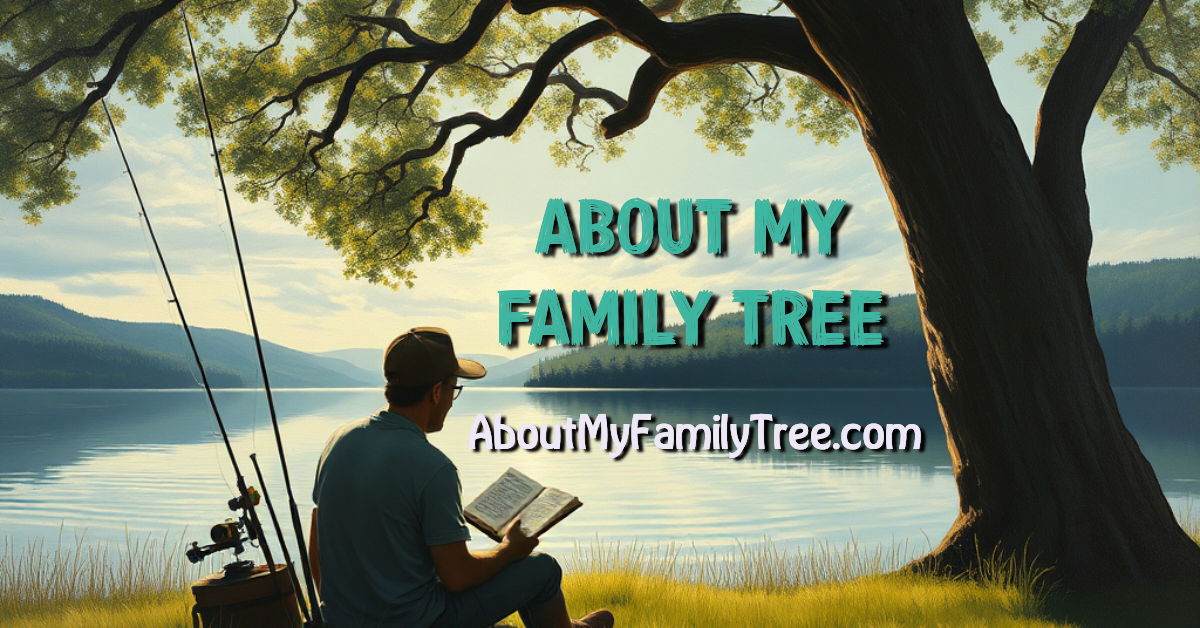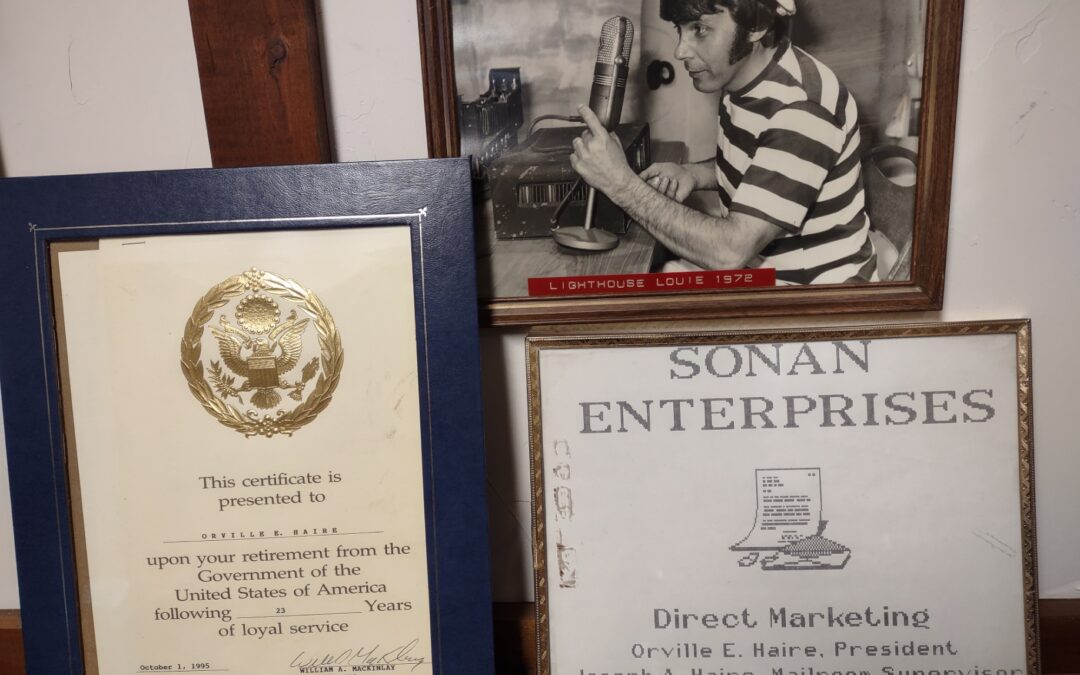The Untold Story of Orville Eugene “Sonny” Haire Jr: From Radio Stardom to FBI Investigation
It’s hard to know where to begin with a story like this, but let’s just say my dad, Orville Eugene “Sonny” Haire Jr, didn’t exactly have an ordinary life. Born in Middletown, Ohio, on November 21, 1937, and raised by a determined single mother, Mildred Margaret Franklin, he carried the strength of his upbringing into everything he did. From spinning country hits as a radio DJ on “The Sonny Haire Show” to captivating kids on his 1970s TV program, “Lighthouse Louie,” he was a man who wore many hats—and wore them well.
But not every chapter was smooth sailing. His dreams of syndicating “Lighthouse Louie” were cut short when the people behind the scenes turned out to be less than reputable. Dad found himself caught up in a federal investigation, taken by the FBI and questioned about his involvement. Spoiler alert: he wasn’t guilty of anything but trusting the wrong folks. Still, it’s a twist in his story that you couldn’t make up. And that’s just one part of his incredible journey—from running the waffle booth at Saint Marys’ Holy Rosary Festival (eventually becoming the chairman) to the countless lives he touched along the way. This is his story, and it’s one worth telling.
Orville Eugene Haire Jr.’s Early Life
When it comes to understanding my father, Orville Eugene Haire Jr, you have to start by looking at where he came from. Born in Middletown, Ohio, on November 21, 1937, Dad’s early life was rooted in small-town values and shaped by the love and determination of his mother, Mildred Margaret Franklin. His story is as much about resilience and hard work as it is about his larger-than-life personality.
Childhood in Middletown, Ohio
Middletown in the 1930s and 1940s wasn’t exactly a bustling metropolis, but it had a heartbeat fueled by the industrial growth of the Midwest. Surrounded by the factories and steel mills that made the region a pivotal hub of American production, Dad grew up in an environment where hard work wasn’t just encouraged—it was expected. Middletown, Ohio’s rich history played a key role in shaping the character of the people who lived there, and my dad was no exception.
Growing up was far from easy. His father wasn’t in the picture, so my grandmother Mildred took on the dual role of provider and nurturer. For a boy growing up in a tight-knit but challenging community, that kind of upbringing laid the foundation for a future filled with perseverance. Dad didn’t have everything handed to him. He had to earn it—whether it was respect, opportunity, or even just a little attention. That scrappy mindset, born from his early days in Middletown, stayed with him his entire life.
But don’t think for a moment that it was all work and no play. Dad had a mischievous streak, and from the stories he told, it seemed like there wasn’t a single corner of Middletown he didn’t explore. Whether it was memorable times at baseball games or fishing by the river, he knew how to make his own fun in a time when entertainment wasn’t just a click away.
The Role of Mildred Margaret Franklin aka “Grandma Graham”
If there was one person who shaped Dad’s values and work ethic, it was his mother, Mildred Margaret Franklin. Born in Springfield, Ohio, on August 23, 1914, Mildred was a force of nature. Her life story was one of adaptability and strength. She moved to Middletown during a period when women were still fighting to establish their independence in a male-dominated society, and she was determined to provide a stable life for her son.
Grandma Graham was a strong willed woman with values she passed down to my father without compromise. She gave my dad two outfits for the entire year, one for dress and one for casual. Anything other than that, my dad had to buy for himself. Growing up during the Great Depression and World War II gave Grandma Graham a resilience that she instilled in her child, teaching Dad that no matter how tough life got, there was always a way through it.
She was also deeply compassionate. As a single mother in a time when that wasn’t common or particularly accepted, she faced whispers and judgment with her chin held high. Her quiet strength and unwavering love taught Dad to stand up for what’s right and to never give up, no matter the odds. It’s no wonder that later in life, he would extend that same sense of care and determination toward his own endeavors, from his radio career to his work in the community.
Dad’s early life and the strong foundation laid by his mother set the stage for everything he would later achieve. Whether it was spinning country hits on the radio or taking the helm of community events, you can trace the roots of his character right back to Middletown and my indomitable Grandma Graham.
The Start of a Radio Career: The Sonny Haire Show
When you think about iconic radio personalities from the mid-20th century, my dad, Orville Eugene “Sonny” Haire Jr, deserves a seat at the table. His voice carried over the airwaves, reaching homes across Ohio and beyond, through “The Sonny Haire Show.” It was more than just a country music program—it was the launchpad for an unforgettable career. Let’s dive into what made his early days in radio so memorable.
Country Music Disc Jockey Days
“The Sonny Haire Show” wasn’t just a radio show; it was an experience. Sonny spun the hottest country tracks of the time, mixing the soul of the Midwest with the twang of the South. Now, if you’re wondering why a local radio show managed to resonate so deeply, it comes down to Sonny’s knack for connection. He made every listener feel like the show was tailored just for them.
Country music, during Sonny’s era, wasn’t just popular—it was a lifeline. It spoke of love, heartbreak, hard work, and community—themes that hit home for his audience. Sonny knew exactly what people wanted to hear. Whether it was Johnny Cash’s gritty vocals or Patsy Cline’s sweet melodies, Sonny had a talent for weaving hits into a story that kept listeners glued to their radios.
One of people’s favorite memories from his radio days comes from the stories he’d share between tracks. He’d talk about local events, mention funny calls from listeners, or just give his two cents on life. It wasn’t just about the music; it was about fostering a sense of community.
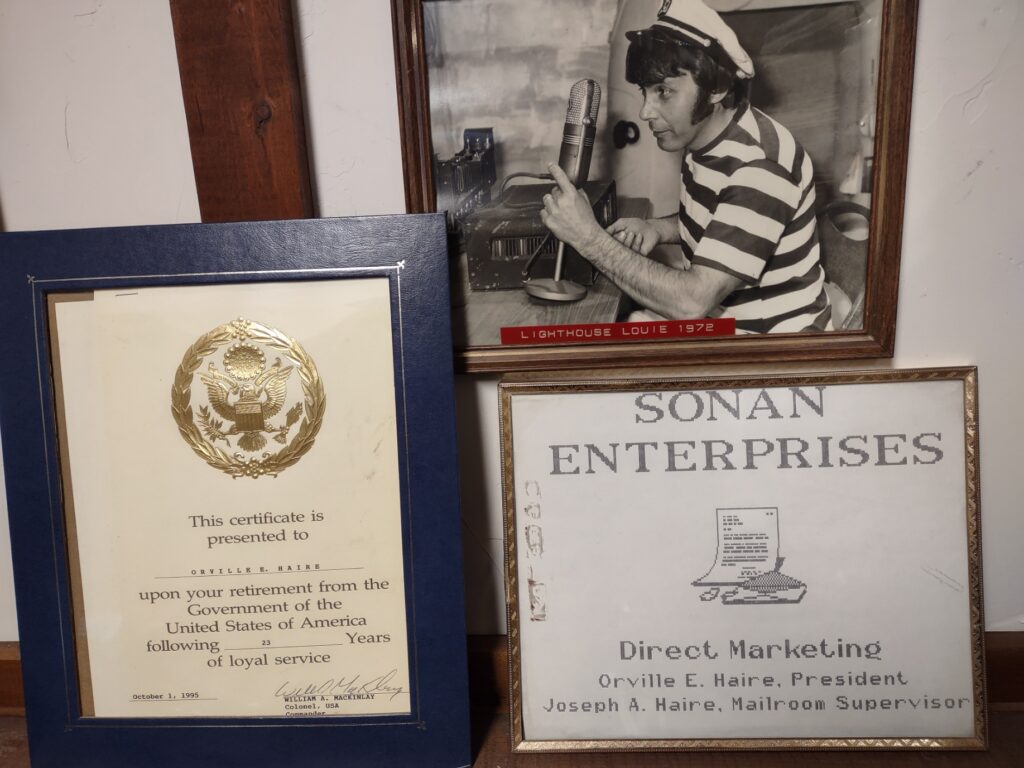
Radio back then wasn’t like today’s streaming platforms. You tuned in because you wanted more than music; you wanted the personality behind the microphone. That’s what made Sonny unique. It wasn’t just his voice; it was the stories, the humor, and the authenticity he brought to every show. Sonny wasn’t just spinning records; he was spinning narratives that stitched his community closer together.
Building a Personal Brand
Long before personal branding became a buzzword, Sonny was pioneering it in his own way. He didn’t have Instagram or TikTok to craft a persona, but trust me, he didn’t need it. He was the type of DJ who could casually mention the local diner on-air, and suddenly, half the town would be sitting there the next day. His influence extended far beyond the studio.
What set him apart was his authenticity, combined with a natural charisma. Sonny wasn’t afraid to let his personality shine. He joked, he laughed, and occasionally, he’d throw in a story that felt more like a conversation with an old friend. He understood that radio wasn’t just a platform—it was a relationship.
By consistently showing up and being himself, he built a loyal audience who hung onto his every word. They trusted him—not just his musical taste, but also his opinions and recommendations. In a way, Sonny was an old-school influencer, long before the term existed.
His personal brand wasn’t crafted using a 5-step template, but it adhered to principles that even modern social media gurus preach. If you’d like tips on how authenticity builds a personal brand, here’s an interesting read: How to Build a Personal Brand as a Radio Host.
Ultimately, Sonny’s ability to connect with people set the stage for the next chapter of his life—television. Without his time behind the microphone shaping his voice, personality, and storytelling skills, the world might never have met Lighthouse Louie. Those early radio days weren’t just a start—they were the training ground that prepared him for everything that followed.
Transition to Television: Lighthouse Louie
Moving from radio to television wasn’t just a career leap for my dad, Orville Eugene “Sonny” Haire Jr.—it was a chance to create something truly unique. “Lighthouse Louie” was more than a children’s TV show; it was a beacon of creativity, humor, and life lessons that resonated with its young audience. But how did it all come together, and why did it end so abruptly? Let’s dig into the creation, rise, and unexpected fall of Lighthouse Louie.
The Creation of Lighthouse Louie
Every great show starts with an idea, and Lighthouse Louie was no exception. Dad had a knack for connecting with kids and understood the importance of creating programming that was both entertaining and meaningful. He envisioned a show centered around a friendly, quirky lighthouse keeper named Louie who would teach kids important values like kindness, honesty, and teamwork.
The format was simple but genius. Each episode featured Louie encountering a new problem, often with the help (or hindrance) of whimsical side characters. Whether it was a moral dilemma or a fun, lighthearted mystery, the show always wrapped up with a lesson that felt organic rather than preachy. Kind of like someone sneaking spinach into your mac and cheese—it was good for you, but it tasted like fun.
Dad brought his skills as a storyteller to the character of Louie, combining humor with warmth. The set, while modest, was charming and imaginative—it felt like you’d stepped into a real lighthouse, the kind a kid’s imagination could run wild in. It all came together with a mix of live-action skits, puppetry, and even musical segments. Lighthouse Louie wasn’t just a show; it was an experience. And it worked.
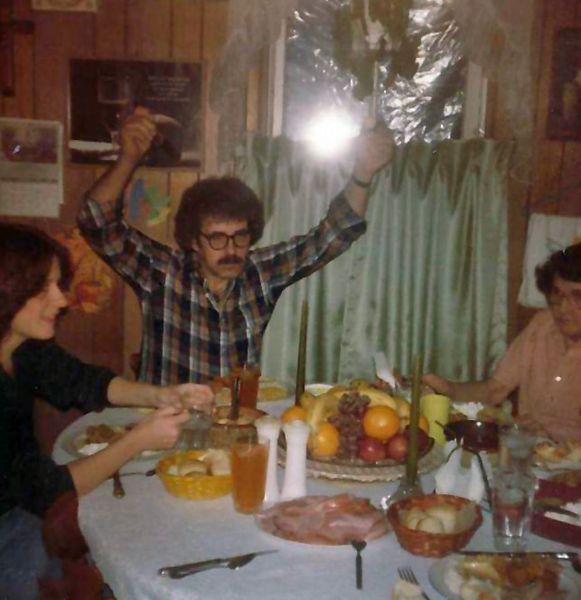
Dad Thanksgiving 1981 with Grandma Graham on the right
The Show’s Popularity and Ambitions for Syndication
From the start, the show captured the attention of kids and parents alike. Lighthouse Louie aired locally out of Springfield, Ohio, but its charm had a way of spreading by word of mouth. Families tuned in to the program not just for laughs, but because it felt like something they could trust. It was clean, heartfelt entertainment in an era when parents were just starting to care about what their kids were exposed to on TV.
The show’s growing popularity sparked much bigger ambitions: syndication. Dad’s team began exploring ways to take Lighthouse Louie to a national stage. They saw the potential for the character and show format to reach children across the country, even possibly creating franchise opportunities like toys or books. Who wouldn’t want their favorite lighthouse keeper on their lunchbox?
It was an exciting time filled with possibilities. Unfortunately, not all the players involved shared Dad’s integrity. The idea of expanding Lighthouse Louie beyond its regional success came with challenges that no one could have anticipated, and it all came crashing down in a way that felt more like a plot twist in a crime drama than a family show.
The Criminal Scandal That Haltered the Syndication
Here’s where things took a dark turn. As it turns out, some of the people involved in the syndication efforts weren’t exactly saints. These behind-the-scenes players had ties to criminal activities, and the FBI got involved when their operation came under investigation. Suddenly, Dad found himself caught in the middle of a federal probe—not because he did anything wrong, but because his name and face were associated with Lighthouse Louie.
To say this was a shock is an understatement. Imagine pouring your heart into something wholesome, only to find out the people helping you grow it had ulterior motives. The FBI didn’t take chances; Dad was brought in for questioning and spent a week cooperating with investigators. While stressful, this was his opportunity to clear his name, which he did. He wasn’t involved in their schemes—he was simply an artist who trusted the wrong people.
The ordeal left him shaken, and it brought Lighthouse Louie’s national ambitions to an abrupt end. The local show remained beloved, but the dream of syndication was over before it could truly begin. It’s heartbreaking to think about what could have been, but Dad never let it taint his character or his passion for connecting with others.
The story of Lighthouse Louie is a testament to his resilience and heart. While it didn’t end the way anyone hoped, the impact it had on the kids who watched it—teaching life lessons while delivering smiles—remains unforgettable.
Continued Impact: Leadership in the Community
My dad wasn’t merely a man of accomplishments or titles—he was a cornerstone of his community. Leadership isn’t about standing above others; it’s about standing with them, and that’s precisely what Dad did. Whether it was frying up waffles or holding the reins of an entire festival, his dedication to Saint Marys, Ohio, was unwavering. Let’s unpack how his actions left a mark that continues to inspire.
The Holy Rosary Festival and the Funnel Cake Booth
Every great leader starts somewhere, right? For Dad, it all began with making “Sonny’s World Famous Funnel Cakes” at the Holy Rosary Festival in Saint Marys. The festival wasn’t just an event; it was a gathering point for the entire town—a mix of fun, faith, and food. At first, he simply volunteered to run the funnel cake booth, and honestly, that might seem unremarkable at first. But not for my dad.
The funnel cake booth became a kind of stage for him. Picture it: rows of golden, freshly-made funnel cakes, flour-dusted aprons, the aroma of hot powdered sugar in the air. It wasn’t just about making a tasty treat. Dad used that booth to connect with people, exchange smiles, and raise funds for a cause that mattered to the community. His enthusiasm was infectious, and before long, people came to look forward to “Sonny’s World Famous Funnel Cakes”—a staple of the festival.
But he didn’t stop there. Over time, his contribution evolved from funnel cakes to leadership itself. Soon, he was no longer just a volunteer but the chairman of the entire festival. When you think about what that entails—organizing countless booths, coordinating volunteers, managing fundraising—it’s a huge responsibility. But he did it with the same spirit and determination that he brought to every task in life.
For years, he spearheaded the festival’s success. He wasn’t just behind the scenes assigning tasks; he was there, front and center, inspiring others to do more for their town. You could say the funnel cake booth was his initial platform, but as chairman, he helped turn the Holy Rosary Festival into a pillar of Saint Marys. For more on the longstanding tradition of this festival, you can check out the Holy Rosary Website.
Inspiring the Community Through Service
Dad once told me, “The best way to lead people is to serve them.” And that’s exactly what he did. His leadership style was never about being the loudest voice in the room or demanding attention—it was about lifting others up through actions big and small. Whether he was greeting festival-goers or handling logistical nightmares, he made it a point to lead with kindness and sincerity.
That kind of approach left an impression. People saw him not just as a leader, but as an example to follow. When you’re in a small town like Saint Marys, every action ripples through the community. His commitment inspired others to step up, take initiative, and give back, too. It wasn’t uncommon for someone to say, “If Sonny can do it, so can I.”
His ability to foster collaboration was remarkable. The Holy Rosary Festival relied on countless volunteers, and Dad had a knack for bringing people together. It didn’t matter if it was your first time volunteering or your fiftieth—he had a way of making you feel valued. That’s the thing about community leadership: it thrives on relationships. By showing up, treating everyone with respect, and leading by example, he built trust that resonated far beyond the festival grounds.
In this way, Dad’s legacy isn’t just about the festivals or the funnel cakes. It’s about how he made people feel seen and encouraged others to make a difference. Leaders come and go, but the values they instill—that domino effect of good deeds—last a lifetime. For a deeper dive into how leadership impacts communities, articles like Top 10 Leadership Initiatives to Generate Impact give some perspective.
At the end of the day, what I admire most is that Dad never saw leadership as a title. To him, it was a service. Something as small as making waffles could spark connection, and something as significant as steering a festival could unite an entire town. That’s a legacy you can’t fake. It’s real, it’s authentic, and it’s left an indelible impact on a place that meant the world to him.
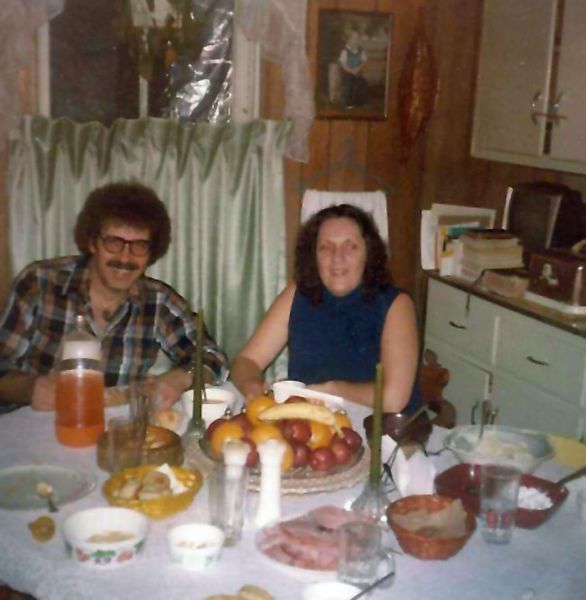
Dad and Mom Thanksgiving 1981
Reflections on a Remarkable Life
Living a life like Dad’s is no small feat. Born in humble beginnings, my dad went on to accomplish so much more than anyone might have expected, from hosting radio and television shows to leading a beloved community festival. His life was defined not just by what he did, but by the way he made people feel—valued, heard, and part of something bigger. Let’s take a closer look at the pillars of his unforgettable story.
Born with Resilience: Lessons from His Childhood
Dad’s early life in Middletown, Ohio, was shaped by hard work, determination, and the steady influence of his mother, Mildred Margaret Franklin aka “Grandma Graham”. Being raised by a single mom during a time when that wasn’t the norm wasn’t easy. It meant sacrifices, long days, and learning lessons the hard way. But one thing I know for sure: Mildred loved her son with every ounce of her being.
She worked tirelessly to provide for him, modeling a work ethic that would later become the cornerstone of his life. From Middletown’s industrial backdrop to the little moments they shared, she laid a foundation of resilience and self-belief. It’s no wonder Dad carried this strength into every chapter of his life.
A Trailblazer in Media
When you talk about Dad’s career, you’re talking about multiple lifetimes of experiences packed into one. First, there were his radio days with “The Sonny Haire Show.” Sitting behind that mic, spinning country records, cracking jokes, and building community through the airwaves, he carved out a space that felt authentic and magnetic. People didn’t just listen; they tuned in because they felt connected.
Then came a leap into television with his character Lighthouse Louie. For a whole generation of kids, Louie wasn’t just a character; he was a teacher and a friend. The show may not have achieved syndication, but its impact was far-reaching nonetheless. Dad showed that even small, local efforts can light up lives.
For more about his early days, you can explore his obituary, which highlights his career milestones.
A Community Leader Who Gave Back
Dad’s work didn’t stop with media. He turned his energy toward leadership in Saint Marys, Ohio, stepping into the role of chairman for the Holy Rosary Festival after years of serving behind the waffle booth. Now, if you’ve ever tasted those waffles or seen him running the show, you know how much heart he poured into every second.
The festival wasn’t just an event; it was a way to bring people together. Through games, raffles, and laughter, Dad built something special. His ability to organize and energize others turned the event into a cornerstone of the town.
His Impact as a Father
Finally, as a dad, Sonny wasn’t about flashy gestures. It was the quiet moments that mattered—teaching me how to serve waffles, sharing stories from the past, and simply showing up. His love wasn’t loud, but it was steady. And that, I think, is the greatest lesson he gave me: to be a constant presence for the people you care about, no matter what.
Dad’s life was extraordinary not because he achieved fame or wealth, but because he left people better than he found them, a trait I always strove to instill in my own son. Whether you knew my dad as Sonny the DJ, Lighthouse Louie, or the guy making his world famous waffles in Saint Marys, chances are, he made you smile. That’s a legacy anyone would be proud of.
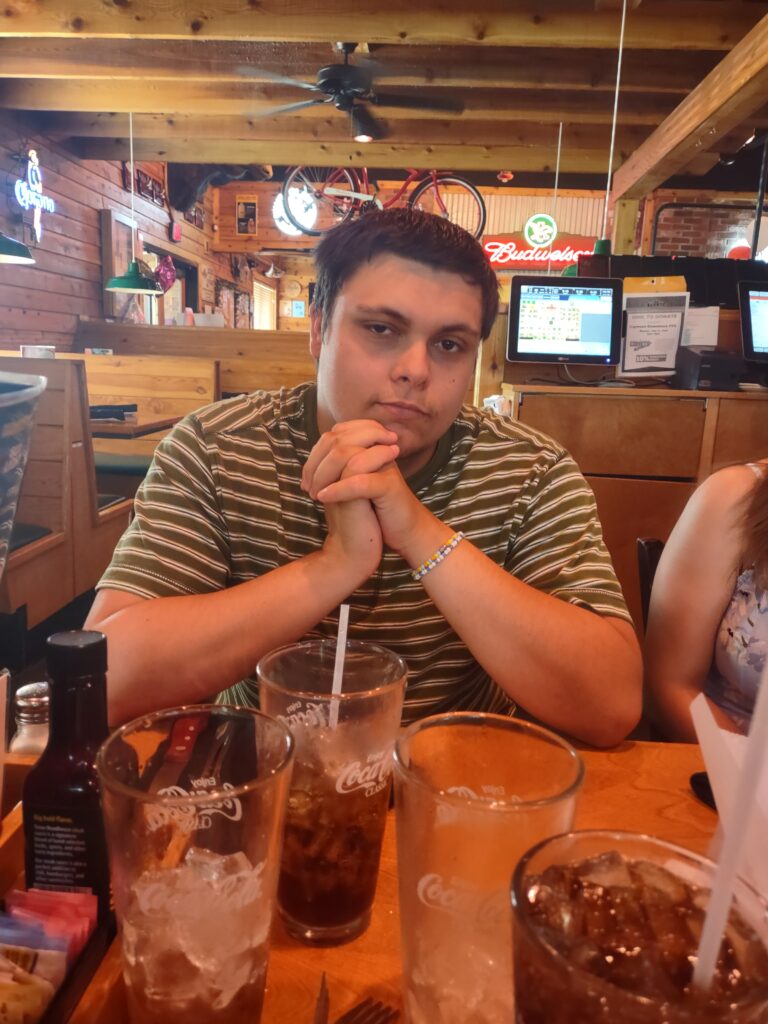
My son Andy Haire
Conclusion
My dad’s story is one for the ages, and we have barely began to scratch the surface. It’s a tale of resilience, creativity, and integrity that shows the beauty in chasing your dreams, even when the road gets rocky. From his beginnings in Middletown, Ohio, to his time in the spotlight as Sonny Haire the DJ and Lighthouse Louie, and finally, to his leadership in the Saint Marys community, he lived a life full of purpose.
What sticks with me most is how effectively he balanced personal ambition with a genuine love for people. Whether it was through a radio show, a kids’ program, or flipping waffles at the festival, he built connections that outlasted any accolades. That’s what really matters—touching lives and lifting up the people around you.
So here’s my takeaway: Don’t let the twists and turns stop you. Stay true to who you are, give back when you can, and always remember that your legacy is not about what you achieve, but about the impact you leave behind. Dad knew that better than anyone.
Return to homepage.
